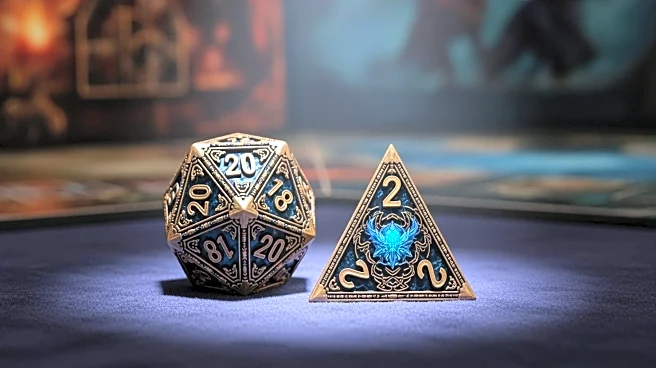What's Happening?
Whitney Moore, a new player in Critical Role Campaign 4, has shared insights into her character Tyranny and her dynamic with Sam Riegel's character, Wicander Halovar. In the campaign, Tyranny is a demon
being taught to be virtuous by Wicander, who is portrayed as a straight man to her chaotic antics. Moore admitted in a recent interview that she underestimated Riegel's ability to out-troll her, leading to a playful rivalry between their characters. The campaign, led by DM Brennan Lee Mulligan, features a complex storyline where Wicander's family operates like an organized crime syndicate under the guise of religion. Tyranny, initially Wicander's minder, becomes his handler as he navigates family betrayals.
Why It's Important?
The dynamics between Moore and Riegel's characters highlight the intricate storytelling and character development that Critical Role is known for. This campaign not only entertains but also explores themes of identity, loyalty, and personal growth. The evolving relationship between Tyranny and Wicander offers viewers a nuanced portrayal of character evolution, reflecting broader human experiences. For fans of tabletop role-playing games, this adds depth to the narrative, enhancing engagement and investment in the storyline. The show's popularity continues to influence the RPG community, inspiring new players and creators.
What's Next?
As the campaign progresses, viewers can expect further development in Tyranny's character arc, particularly her internal conflicts and shifting loyalties. The ongoing rivalry with Wicander may lead to unexpected alliances or betrayals, adding suspense to the storyline. Fans can follow the campaign on YouTube, with episodes available for streaming, allowing them to stay updated on the unfolding drama and character interactions.
Beyond the Headlines
The portrayal of Tyranny's character development raises questions about identity and belonging, especially as she distances herself from her demon origins. This narrative could resonate with audiences who have experienced similar struggles with identity and societal expectations. The campaign's exploration of these themes may encourage discussions about personal growth and the impact of external influences on one's sense of self.








